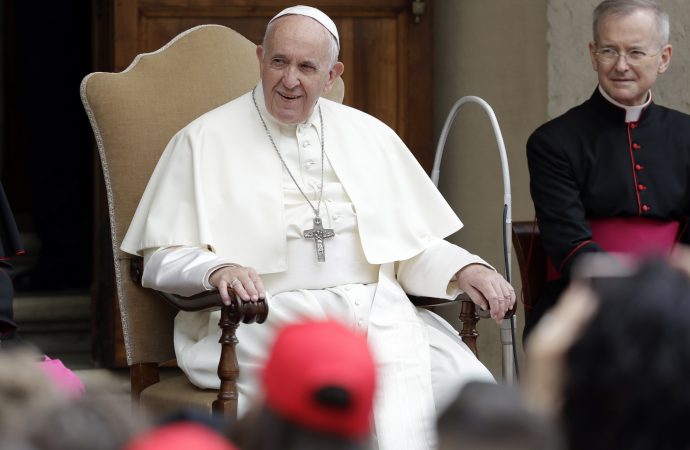Fear of change is a “temptation of the devil,” Pope Francis told thousands of members of the Charismatic Renewal on Saturday.
He also noted that in the Church, “governance also means service,” and that the best evangelization programs are set to fail if done without love.
Though fear of change is “quite human,” the pope said that it shouldn’t be the case with spiritual people, as Jesus said in the Book of Revelation: “Behold, I make all things new.”
“The new things of God are always a blessing because they flow from his loving heart,” said Francis, adding that there’s a temptation not to rock the boat when things seem to be going well.
“This kind of thinking does not come from the Spirit. Perhaps from the spirit of the world, but not from the Holy Spirit,” Francis said. “Don’t make this mistake.”
The pope’s words came as he addressed 6,000 participants of a June 6-8 encounter in Rome promoted by Catholic Charismatic Renewal International Service (CHARIS). The audience with the pope, held at the Paul VI Hall, began with a choir singing Vive el Se√±or [The Lord Lives], a song often sung at Mass in Pope Francis’s Argentinian homeland which he considers one of his favorites.
CHARIS - coordinated by the Vatican’s Dicastery for Laity, Family and Life, headed by American Cardinal Kevin Farrell - is a newly formed institution that last year replaced the International Catholic Charismatic Renewal Service and the Catholic Fraternity of Charismatic Covenant Communities and Fellowships.
CHARIS represents an estimated 115 million Catholic charismatics around the world, and is meant to serve as a point of reference rather than a formal, hierarchical structure. Unlike other ecclesial movements, such as Communion and Liberation or the Focolare, Catholic charismatics are not tied to a particular founder or structure.
According to Francis, this represents a “A new and unique service of communion,” and in his talk he explained what he meant.
He said that CHARIS performs a “unique” service because it is meant to assist all the charismatic groups that the Spirit “has raised up in the world.”
“Not one office to serve some and another office to serve others,” he said. “Service. Not governance, but service. In the Church, as we know, governance is also service, but governance is not your task. You are being asked to care for a variety of needs and to assist the journey in the best way possible.”
Speaking off-the-cuff, Francis also defined service as a “way to fight against corruption,” adding that “the devil, always comes in through the pockets … To serve is to give, give, give.”
Speaking about communion, he said that the Charismatic movement is called to work “with hearts united as one, turned to the Father, and testifying to unity in diversity.” As members of one family, he said, “no one member is more important than another, neither in virtue of age, intelligence or ability, for all are beloved children of the same Father.”
Speaking about the youth, Francis said he was pleased to see they had a high profile during the meeting in Rome, because they are “the present and the future of the Church,” so they should be given the chance to “exercise the responsibility that is theirs.”
Lastly, he urged the members of the Charismatic movement to share the baptism in the Holy Spirit with the whole Church, to be united in the body of Christ and to be at the service of the poor, as they are “the forms of witness which, by virtue of baptism, all of us are called to give for the evangelization of the world.”
Speaking about service to the poor, he noted that it refers to those who have needs both material and spiritual. Francis joked that this might lead some to believe that the Renewal “become Communist, but no, this is the Gospel!”
He said evangelization “is not proselytism but first and foremost witness: A witness of love.”
“To evangelize is to love. It is to share God’s love for every man, woman and child,” he said, adding that evangelization plans and offices are “useless” without love.
An evangelization based on ideology and methodology and not focused on the person and society, belongs to “the spirit of the world.”

